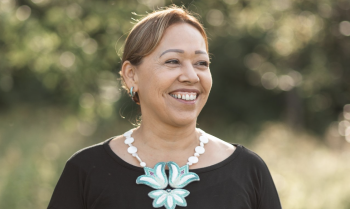Image Caption
Local Journalism Initiative Reporter
Windspeaker.com
Six Indigenous filmmakers, including two from Canada, will be the next cohort of the 4th World Media Lab 2025 fellowship program.
For 10 years the program has been offering mid-career Indigenous filmmakers the opportunity to develop their filmmaking skills and networks through a comprehensive year of hands-on training and networking.
The concept for the program began with a Coast Salish Elder and has been designed to uplift the voices and perspectives of Indigenous artists.
“Essentially the fellowship began in 2015 in a response to recognizing that in the film and media industry, there’s a lot of opportunities for first timers or for seasoned folks but there’s not a ton of opportunity for people who are in that in-between space,” said Tracy Rector, founder of 4th World Media Lab.
Those from Canada chosen for the 2025 program are Katsitsionni Fox, who is from Akwesasne Mohawk Nation, and Jules Arita Koostachin, a member of Attawapiskat First Nation in Northern Ontario, who is now living in Vancouver.
Criteria for the program includes at least two years minimum experience in the industry. Additionally, the board will look at their creativity, commitment to their craft and how their work supports their communities.
Throughout the year the group will attend three major film festivals where they will learn how to approach various aspects of the industry including networking, accessing funding and the business itself.
The three major events the fellowship will attend include the Big Sky Documentary Film Festival in Montana, Seattle International Film Festival and Camden International Film Festival in Maine.
“I’m super excited, what a great honour to be chosen for the 4th World Media Lab,” Fox said. “I’m really excited to get to know all the other filmmakers.”
Fox has been pursuing her dream career in the film industry for the past 10 years.
Many of her own projects highlight Indigenous women who are stepping into their power.
Her award-winning documentaries include Ohero:kon – Under the Husk, and Without a Whisper – Konnon:kwe.
Her skills encompass all the aspects of filmmaking including cinematography, sound, producing, directing and even training others to help with the production of her projects.
“You use what you have, especially when you’re doing it in a small community,” Fox said. “There’s not always people around that know how to do film work.”
Fox added she’s anticipating the upcoming fellowship to help her step out of her comfort zone.
“I’m so looking forward to going to all the festivals and meeting and networking with other filmmakers and industry people,” she said. “I’m really comfortable in the short doc, telling short stories because that’s what I’ve been doing for the last 10 years. But for this fellowship I want to focus on doing a feature film, which is something I haven’t done before and I think it feels like a good time to step into that because I’ll be around so many experienced people and meeting new people.”
These are the types of opportunities and experiences that were really helpful in furthering alumna Paige Bethmann in her career.
“I really enjoyed collaborating with other Indigenous filmmakers which was a really incredible experience because I felt like there were things that could just be unsaid which was really a big relief where you kind of have a cohort of filmmakers who share experiences that you have and to not need to exhaust yourself in like explaining to non-native people the entire history of our being,” she said.
The experience allowed Bethmann to really show up as her authentic self.
Another key highlight she reflects on often is the friendships and professional relationships she made with her cohort.
“It is like a support system that allows you to return and be all together when you’re navigating a very western industry and you can call on your cohort to support you in those moments,” Bethmann added.
With the training through the fellowship in accessing funding, Bethmann received over $1 million in funding for her film Remaining Native, which will be premiering in March.
“4th World contributed to that,” she said adding attending various festivals and meeting funders and others were key as well.
This support and success for the participants is the purpose of the fellowship.
“We hope that people build across barriers and boundaries and differences,” said Rector. “Then we also hope that in terms of career, people feel as though they are supported as they navigate these predominantly exclusive spaces that haven’t always been available to Indigenous people.”
Meanwhile, American filmmakers chosen for this year’s cohort are Kekama Amona, James Johnson III, Tiare Ribeaux and Steph Viera.
For more information on applying for the fellowship in 2026 visit 4th World Media Lab.

